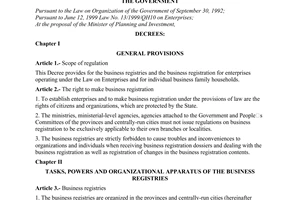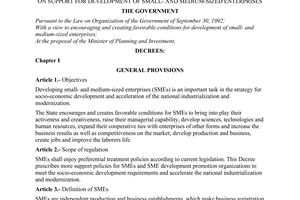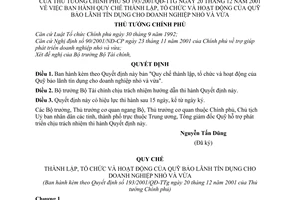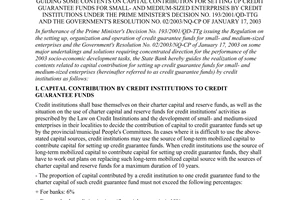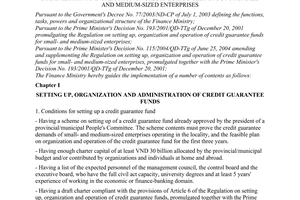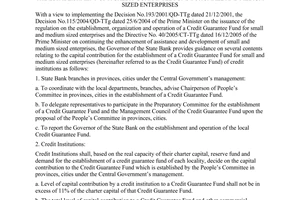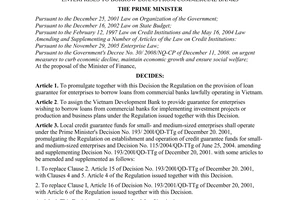Decision no. 193/2001/QD-TTg of December 20, 2001 issuing the regulation on the setting up, organization and operation of credit guarantee funds for small- and medium-sized enterprises đã được thay thế bởi Decision No. 58/2013/QĐ-TTg credit guarantee funds for medium and small enterprises và được áp dụng kể từ ngày 02/12/2013.
Nội dung toàn văn Decision no. 193/2001/QD-TTg of December 20, 2001 issuing the regulation on the setting up, organization and operation of credit guarantee funds for small- and medium-sized enterprises
|
THE
PRIME MINISTER OF GOVERNMENT |
SOCIALIST
REPUBLIC OF VIET NAM |
|
No: 193/2001/QD-TTg |
Hanoi, December 20, 2001 |
DECISION
ISSUING THE REGULATION ON THE SETTING UP, ORGANIZATION AND OPERATION OF CREDIT GUARANTEE FUNDS FOR SMALL- AND MEDIUM-SIZED ENTERPRISES
THE PRIME MINISTER
Pursuant to the Law on Organization of the
Government of September 30, 1992;
Pursuant to the Government’s Decree No.90/2001/ND-CP of November 23, 2001 on
support for development of small- and medium-sized enterprises;
At the proposal of the Finance Minister,
DECIDES:
Article 1.- To issue together with this Decision the Regulation on the setting up, organization and operation of credit guarantee funds for small- and medium-sized enterprises.
Article 2.- The Finance Minister shall have to guide the implementation of this Decision.
Article 3.- This Decision takes effect 15 days after its signing.
The ministers, the heads of the ministerial-level agencies, the heads of the agencies attached to the Government, the presidents of the People’s Committees of the provinces and centrally-run cities and the General Director of the Development Assistance Fund shall have to implement this Decision.
|
FOR THE PRIME MINISTER |
REGULATION
ON THE SETTING UP, ORGANIZATION AND OPERATION OF CREDIT
GUARANTEE FUNDS FOR SMALL- AND MEDIUM-SIZED ENTERPRISES
(Issued together with the Prime Minister’s Decision No.193/2001/QD-TTg of
December 20, 2001)
Chapter I
GENERAL PROVISIONS
Article 1.- This Regulation prescribes the setting up, organization and operation of credit guarantee funds (CGFs) for small- and medium-sized enterprises (SMEs) in the provinces and centrally-run cities (hereafter referred to as CGFs for short).
CGFs shall be set up and managed by the People’s Committees of the provinces and centrally-run cities in order to grant credit guarantee to SMEs.
Article 2.- Each CGF is a financial institution operating for non-profit purposes, ensuring the recovery of capital and self-payment of expenses. It has legal person status, charter capital, balance sheet and its own seal and may open accounts at the State Treasury and domestic commercial banks.
CGFs shall be exempt from tax payment and State budget remittances for their activities of granting credit guarantee to SMEs.
Article 3.- A CGF’s operation capital shall be created from the following sources:
1. Charter capital, including:
a/ Capital allocated from the budget of a province or centrally-run city, which must not exceed 30% of the minimum charter capital prescribed in Article 4 of this Regulation;
b/ Capital contributed by credit institutions;
c/ Capital contributed by enterprises;
d/ Capital contributed by production and/or business associations, organizations representing and supporting SMEs.
2. Lawful aid capital (including ODA capital) provided by organizations and individuals inside and outside the country for the purpose of developing SMEs, cooperatives as well as agricultural, forestry and fishery development programs.
3. Capital supplemented from the results of operation of CGFs as prescribed.
Chapter II
SETTING UP OF CGFS
Article 4.- Setting-up conditions
1. Having enough charter capital of at least VND 30 billion.
2. Having a list of the expected Management Council, Control Board and Executive Board members with full civil act capacity and professional qualifications suitable to operation requirements of the CGF.
3. Having a draft charter and plan on organization and operation of the CGF, which accord with the provisions of this Regulation and other law provisions.
Article 5.- Order of setting up CGFs
1. Provinces and centrally-run cities that wish to set up CGFs shall have to elaborate projects to be ratified by the presidents of the provincial/municipal People’s Committees.
2. The presidents of the People’s Committees of the provinces and centrally-run cities shall consider and decide the setting up of CGFs in their respective localities, ensuring the satisfaction of all conditions prescribed in Article 4 of this Regulation.
3. The presidents of the provincial/municipal People’s Committees shall have to make and send reports on the setting up of CGFs to the Finance Ministry for summing up and further reporting to the Prime Minister.
Article 6.- The charter on organization and operation of a CGF shall be ratified by the president of the People’s Committee of the province or centrally-run city and must include all the following main contents:
1. Its name and location of headquarters;
2. The contents and scope of its operation.
3. Its operation term.
4. Its charter capital, list and capital contribution levels of organizations joining it.
5. Tasks and powers of its Management Council, Control Board and Executive Board as prescribed in Articles 10, 11, 12 and 13 of this Regulation.
6. Its financial management principles.
7. Procedures for amendment of its charter.
8. The relationship between the CGF and State management agencies, credit institutions and customers.
9. The settlement of disputes and dissolution of the CGF.
Article 7.- Within 6 months after the president of the provincial/municipal People’s Committee issues the setting-up decision, the CGF shall have to commence its operation.
Chapter III
ORGANIZATIONAL
STRUCTURE, MANAGEMENT AND ADMINISTRATION
OF CGFS
Article 8.- The managerial and executive apparatus of a CGF includes the Management Council, the Control Board under the Management Council and the Executive Board.
The appointment, dismissal, commendation, reward and discipline of members of the Management Council as well as director and deputy directors of the CGF shall be decided by the president of the People’s Committee of the province or centrally-run city.
Article 9.- The Management Council of the CGF is composed of 2 full-time members being its chairman and vice chairman, and part-time members being competent representatives of the provincial/municipal Finance and Pricing Service, Planning and Investment Service, the State Bank’s branch and representatives of organizations contributing capital to the CGF.
Article 10.- The CGF’s Management Council has the following tasks and powers:
1. To submit to the president of the People’s Committee of the province or centrally-run city for ratification, supplement and/or amendment the CGF’s charter and operational mechanism.
2. To adopt the CGF’s operational orientations, financial plan and final account settlement reports.
3. To perform tasks and exercise powers as provided for in the charter of the CGF.
4. To supervise and inspect the CGF’s activities according to its charter and decisions of the Management Council.
5. To decide on the appointment, dismissal, commendation, reward and discipline of members of the Control Board.
6. To examine reports of the Control Board and settle complaints as prescribed. To be entitled to use the CGF’s seal to perform the Council’s tasks and exercise its powers.
Article 11.- The Management Council’s working regime shall comply with the provisions of law and charter of the CGF. The costs of the Management Council’s working facilities and its operation funding shall be accounted into the CGF’s operational expenses.
Article 12.- The Control Board shall be answerable to the Management Council for the control of all the CGF’s activities.
The CGF’s Control Board is composed of 3 members at most, including the head and 1 full-time member. The Control Board’s members must have professional qualifications and occupational morals.
The Control Board has the following tasks and powers:
1. To inspect and supervise the implementation of undertakings, policies, operational regimes and regulations in the activities of the CGF so as to raise the efficiency of its activities, ensure safety for the State�s and the fund’s properties, report to the fund’s Management Council on the inspection and supervision results and propose handling measures.
2. To carry out its jobs independently according to the program already approved by the Management Council.
3. To be liable to present its reports and proposals on the control results, evaluation reports and financial account settlements at the meetings of the CGF’s Management Council but to have no voting right.
4. To examine and submit to the fund’s Management Council for settlement complaints of organizations and individuals having ties with the CGF.
Article 13.- The CGF’s Executive Board is composed of its director, deputy directors and a number of specialized assistants
The director is the CGF’s legal person representative, who takes responsibility before the Management Council and before law for all the CGF’s activities. The CGF director’s tasks and powers shall comply with the fund’s charter.
The operational administration of the CGF shall be delegated to the Development Assistance Fund under a delegation contract. The Development Assistance Fund shall enjoy service charge therefrom.
Chapter IV
CONTENTS OF OPERATION OF CGFS
Article 14.- A CGF shall grant credit guarantee to its customers being the following subjects:
1. Enterprises of all economic sectors, which are classified as SMEs according to law provisions.
2. Cooperatives and unions of cooperatives.
3. Individual business households as prescribed by the Government’s Decree No.02/2000/ND-CP of February 3, 2000 on business registration.
4. Farm owners, peasants and fishermen’s households that carry out projects on aquaculture, offshore fishing, planting of industrial trees or husbandry...
Article 15.- Conditions for being granted credit guarantee
1. Having feasible investment projects and production and/or business plans, being capable of repaying loan capital.
2. The total value of the CGF’s properties mortgaged or pledged at credit institutions is equal to at least 30% of the loan value as prescribed by law.
3. Owing no tax debts or overdue debts to credit institutions or other economic organizations.
Article 16.- Credit guarantee levels
1. A CGF shall grant credit guarantee equal to no more than 80% of the difference between the loan value and the value of the customer’s properties mortgaged or pledged at credit institution(s).
2. The credit guarantee level for a customer shall not exceed 15% of the capital of the CGF’s owner.
Article 17.- Credit guarantee term
The credit guarantee term shall be determined according to the loan term already agreed upon between the customer and the concerned credit institution.
Article 18.- Credit guarantee fees
Credit guarantee fees include:
- The fee for evaluation of credit guarantee dossiers, which is equal to VND 50,000 for each credit guarantee application and shall be remitted to the CGF together with the credit guarantee dossier.
- The credit guarantee fee, which is equal to 0.8%/year and calculated on the credit-guaranteed sum of money. The credit guarantee fee payment time-limit shall be inscribed in the guarantee contract under the agreement between the CGF and the customer, corresponding to the credit guarantee term.
Article 19.- Dossier of application for credit guarantee
1. The customer’s application for credit guarantee.
2. Documents and papers proving that the customer satisfies all conditions for being granted credit guarantee as prescribed in Article 15 of this Regulation.
Article 20.- Dossier evaluation and decision on credit guarantee
1. The CGF shall have to evaluate the legitimacy of documents, the feasibility and loan capital-repayment capability of the production and/or business development project sent by the customer.
2. The CGF shall have to work out regulations for evaluation of efficiency of the customer’s investment project as well as production and/or business plan on the principle of ensuring the independence and clear definition of individuals responsibilities and the join responsibilities of the evaluators and the credit guarantee deciders.
3. Within 15 days after receiving a dossier of application for credit guarantee, the CGF shall have to consider the granting of credit guarantee to the customer. The decision on granting credit guarantee to the customer shall be made in writing in form of a credit guarantee contract between the CGF, the credit institution and the customer. In case of refusing to grant credit guarantee, the CGF shall have to notify such in writing, clearly stating the reasons therefor.
Article 21.- Rights and obligations of parties
1. The CGFs rights and obligations:
a/ To request customers to provide relevant papers and documents and to prove that they fully meet conditions for being granted credit guarantee as prescribed in Article 15 of this Regulation.
b/ To evaluate financial plans and debt-repayment plans of investment projects as well as production and business plans sent by customers.
c/ To collect credit guarantee fees as prescribed.
d/ To coordinate with credit institutions in inspecting and supervising the process of capital use and debt repayment by customers.
e/ To exercise their rights and powers according to commitments with credit institutions and customers.
f/ To have the right to refuse the granting of credit guarantee to customers who are ineligible or fail to meet the conditions mentioned in Articles 14 and 15 of this Regulation.
g/ To request credit institutions to stop the provision of loans or recover debts ahead of time when detecting any signs of law violations or breaches of credit guarantee contracts by customers.
h/ To supply information as well as regular and irregular reports to the State management agencies as prescribed.
2. The rights and obligations of credit institutions shall comply with the provisions of the Law on Credit Institutions and legal documents guiding the implementation thereof.
3. Rights and obligations of the guaranteed
a/ To request the CGFs to abide by commitments in credit guarantee contracts.
b/ To fully supply information and documents related to the granting of guarantee at the CGFs or credit institutions requests and take responsibility for the accuracy and legitimacy of these information and documents.
c/ To submit to inspection and control by the CGFs and credit institutions.
d/ To fulfill all commitments in credit guarantee contracts, and use loan capital for the right purposes.
e/ To pay credit guarantee fees to the CGFs in full and on time.
f/ To fully repay to the CGFs those debts which the latter have paid on their behalf as well as the interests and expenses arising therefrom.
Article 22.- Credit guarantee multiple
The credit guarantee multiple of a CGF in the first three years must not exceed 5 times its operation capital. The Finance Minister shall prescribe credit guarantee multiple for the CGF in the subsequent years.
Article 23.- Fulfillment of guarantee commitment
1. If customers cannot repay or fully repay their due debts to credit institutions and still fail to repay them even though the credit institutions have applied all measures to recover debts (including debt reschedule and extension), such credit institutions shall have to notify the CGFs thereof in writing.
2. After receiving notices, the CGFs shall have to repay debts, on behalf of the customers, to credit institutions according to their committed guarantee liability.
Article 24.- Debt acknowledgement and guarantee redemption
The guaranteed customers shall have to acknowledge compulsory debts and repay the CGFs sums of money, which the latter have paid on their behalf. As from the time the CGFs pay debts for the customers, the latter shall bear the law-prescribed overdue debt interest rates on the sums of money the CGFs have paid on their behalf.
Chapter V
FINANCE, ACCOUNTANCY COST-ACCOUNTING
Article 25.- The CGFs shall observe the financial regime, open accounting books, record accounting vouchers and conduct cost-accounting of arising economic operations strictly according to law provisions and guidance of the Finance Ministry.
The CGFs fiscal year starts on January 1 and ends on December 31 of the calendar year.
Article 26.- The CGFs operation capital must be used for the right purposes and efficiently, ensuring safety according to the following stipulations:
1. Granting of credit guarantee to customers according to the provisions of this Regulation.
2. Investment in the procurement of fixed assets in service of operation of the CGFs, which, however, must not exceed 7% of their charter capital.
3. Opening of deposit accounts at the State Treasury and domestic credit institutions.
4. Investment in the purchase of Government bonds.
Article 27.- Wages and allowances of officials, employees and the Management Council and Control Board members of CGFs shall comply with the State regime prescribed for State enterprises.
Article 28.- The annual financial revenue-expenditure difference of a CGF is the difference between its total revenues and total expenses, which shall be deducted for setting up the following funds:
1. 15% for the reserve fund to supplement the operation capital of the CGF.
2. 10% for the financial reserve fund to cover risks caused by objective circumstances.
3. 30% for the professional development investment fund.
4. The reward and welfare funds, with the maximum amount being equal to three months� paid wages in the year.
5. The remainder shall be used as profit dividends to organizations participating contributing capital to the CGF.
Chapter VI
STATE MANAGEMENT OVER CGFS
Article 29.- The Finance Ministry is the body exercising the State management over CGFs, having the following tasks:
1. To guide, inspect and supervise the implementation of the Regulation on the setting up, organization and operation of CGFs. If detecting violations in the process of setting up and operation of CGFs, to have the right to request the presidents of the People’s Committees of the provinces and centrally-run cities to take immediate remedies, ensuring the strict compliance with the Regulation on the setting up, organization and operation of the funds; to report cases falling beyond its jurisdiction to the Prime Minister for decision.
2. To guide and inspect the observance of the financial regime by CGFs.
3. To coordinate with the People’s Committees of the provinces and centrally-run cities in organizing the monitoring, sum-up and evaluation of the CGFs’ operation results; to elaborate the development orientations and finalize legal documents on organization and operation of the funds of this type and submit them to the Prime Minister.
Article 30.- The People’s Committees of the provinces and centrally-run cities have the following tasks:
1. To set up and dissolve CGFs according to law provisions and this Regulation.
2. To appraise conditions and dossiers of application for setting up and operation of CGFs in their respective localities.
3. To directly manage and oversee the situation of operation of CGFs in their respective localities.
4. To report regularly and extraordinarily to the Finance Ministry on the results and situation of operation of CGFs, proposing measures to remove difficulties in the funds’ activities; to propose amendments and/or supplements to the mechanism and policies for operation of the funds.
Chapter VII
IMPLEMENTATION PROVISIONS
Article 31.- The ministers, the heads of the ministerial-level agencies, the heads of the agencies attached to the Government, the presidents of the People’s Committees of the provinces and centrally-run cities and the General Director of the Development Assistance Fund shall have to implement this Regulation.
|
FOR THE PRIME MINISTER |
